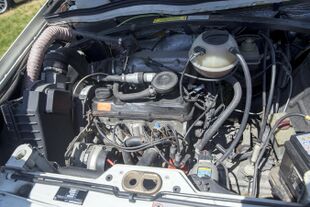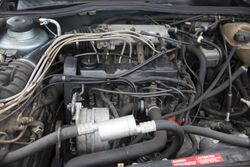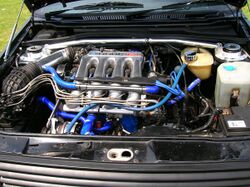Engineering:Volkswagen EA827 engine
| Volkswagen EA827 (EA113) | |
|---|---|
 | |
| Overview | |
| Manufacturer | Volkswagen Group |
| Production | 1972–2013[1][2][3] |
| Layout | |
| Configuration | Inline-4 |
| Displacement | 1,297–1,984 cc (1.3–2.0 L; 79.1–121.1 cu in) |
| Cylinder bore | 75–82.5 mm (3.0–3.2 in) |
| Piston stroke | 73.4–92.8 mm (2.89–3.65 in) |
| Block material | Gray cast iron |
| Head material | Cast aluminium alloy |
| Valvetrain | 2-, 4-, or 5-valve[4] valves per cylinder, hydraulic valve lifters, belt-driven single overhead camshaft (SOHC) |
| Compression ratio | 8.0:1-10.5:1 |
| Combustion | |
| Fuel system | Carburetor or electronic fuel injection |
| Management | Bosch Motronic or Siemens Simos electronic engine control unit (ECU) |
| Fuel type | Petrol |
| Oil system | Wet sump |
| Cooling system | Water-cooled |
| Output | |
| Power output | 40–155 kW (54–211 PS; 54–208 bhp) |
| Torque output | 144–280 N⋅m (106–207 lb⋅ft) |
| Dimensions | |
| Dry weight | ~ 110 kg (240 lb) |
The EA827 family of petrol engines was initially developed by Audi under Ludwig Kraus leadership and introduced in 1972 by the B1-series Audi 80, and went on to power many Volkswagen Group models.[5] This is a very robust water-cooled engine configuration for four- up to eight- cylinders. In Brazil this engine was produced under the name Volkswagen AP (pt) AP (Alta Performance, "high performance").[6]
There was also a range of EA827 diesel engines, sharing its 88-millimetre (3.46 in) cylinder spacing with the spark ignition petrol engines.[7]
60 hp 1.3
- configuration
- 1,297 cc (78 cu in) inline-four, bore 75 mm (3.0 in) × stroke 73.4 mm (2.9 in)
- head
- SOHC two valves per cylinder
- block
- grey cast iron, five bearings
- output
- 44 kW (60 PS; 59 hp) at 5,500 rpm, 100 N⋅m (74 lb⋅ft) at 3,200 rpm
- fuel
- carburettor
- application
- Audi 80, Volkswagen Passat
84 hp 1.4
- configuration
- 1,423 cc inline-four, bore 76.5 mm (3.0 in) × stroke 77.4 mm (3.0 in)
- head
- SOHC 2-valve per cylinder, 10:1 compression
- block
- cast iron, five bearings
- output
- 62 kW (84 PS; 83 hp) at 5,500 rpm, 118 N⋅m (87 lb⋅ft) at 4,200 rpm
- fuel
- electronic injection [SPI] or carburettor
- aspiration
- cast aluminum intake manifold, cast iron exhaust manifold
- application
- Volkswagen Citi Golf (South Africa)
70 hp 1.5
- configuration
- 1,457 cc (89 cu in) inline-four, bore 79.5 mm (3.1 in) × stroke 73.4 mm (2.9 in)
- head
- SOHC 2-valve per cylinder
- block
- grey cast iron, five bearings
- output
- 51 kW (70 PS; 69 hp) at 5,600 rpm, 121 N⋅m (89 lb⋅ft) at 2,800 rpm
- fuel
- carburettor
- application
- Volkswagen Golf, Audi 80, Volkswagen Passat, Volkswagen Scirocco
85 hp 1.5
- configuration
- 1,457 cc (89 in³) inline-four, bore 79.5 mm (3.1 in) × stroke 73.4 mm (2.9 in)
- head
- SOHC 2-valve per cylinder
- block
- grey cast iron, five bearings
- output
- 63 kW (86 PS; 84 hp) at 5,600 rpm, 125 N⋅m (92 lb⋅ft) at 3,200 rpm
- fuel
- carburettor
- application
- Volkswagen Golf, Audi 80, Volkswagen Passat
65–110 hp 1.6
- configuration
- 1588 cc (96 in³) inline 4, bore 79.5 mm (3.1 in) × stroke 80 mm (3.1 in)
- head
- SOHC 2-valve per cylinder
- block
- grey cast iron, five bearings
- output
- 63 kW (85 PS; 84 hp) at 5600 rpm, 125 N⋅m (92 lb⋅ft) at 2800 rpm
- output (GTI)
- 81 kW (110 PS; 108 hp) at 5800 rpm, 150 N⋅m (111 lb⋅ft) at 4000 rpm
- fuel
- carburettor, K-Jetronic
- application
- Volkswagen Golf GTI, Volkswagen Scirocco GTI, Audi 80, Volkswagen Passat
70–102 hp 1.6
- configuration
- 1595 cc (97 in³) inline 4, bore 81 mm (3.2 in) × stroke 77.4 mm (3.0 in), 1.05 ratio
- head
- SOHC 2-valve per cylinder
- block
- grey cast iron, five bearings
- output
| Output | Torque | Engine code | Applications |
|---|---|---|---|
| 51 kW (70 PS; 69 hp) /5200 rpm | 125 N⋅m (92 lb⋅ft) /2800 rpm | PN; PP | Audi 80, Volkswagen Golf Mk II, Volkswagen Passat (B2), Volkswagen Santana (B2) |
| 74 kW (101 PS; 100 hp) /5800 rpm | 135 N⋅m (100 lb⋅ft) /4400 rpm | AEK | Volkswagen Golf Mk III, Volkswagen Vento, Volkswagen Passat B4 |
| 74 kW (101 PS; 100 hp) /5800 rpm | 140 N⋅m (103 lb⋅ft) /3500 rpm | AFT | Volkswagen Golf Mk III, Volkswagen Vento, Volkswagen Passat B4, SEAT Ibiza Mk I, Seat Córdoba Mk I, Seat Toledo Mk I |
| 74 kW (100 PS; 99 hp) /5300 rpm | 140 N⋅m (103 lb⋅ft) /3800 rpm | ADP; AHL | Audi A4 B5, Volkswagen Passat B5 |
| 74 kW (101 PS; 100 hp) /5600 rpm | 145 N⋅m (107 lb⋅ft) /3800 rpm | AEH; AKL; APF; AUR | Audi A3 Mk I, Audi A4 B5, Volkswagen Polo Mk III Classic/Variant, Volkswagen Golf Mk IV, Volkswagen Bora, Volkswagen Passat B5, Volkswagen New Beetle, Škoda Octavia, SEAT Ibiza Mk I, Seat Córdoba Mk I, Seat Toledo Mk II |
| 75 kW (102 PS; 101 hp) /5600 rpm | 148 N⋅m (109 lb⋅ft) /3800 rpm | AYD; AWH; AVU; ALZ; BFQ; BFS; BGU; BSE; BSF; AFX | Audi A3, Audi A4 B5-B7, Seat León Mk II, SEAT Altea, Seat Toledo Mk III, Škoda Octavia Mk I/II, Volkswagen Golf Mk IV/V/VI, Volkswagen Bora/Jetta, Volkswagen New Beetle, Volkswagen Passat B5/B6, Citi Golf 1.6i and variants |
- fuel
- Ecotronic carburettor, KE-Jetronic, Simos AFX has VWSA Bosch MP9 injection
- aspiration
- cast aluminum intake manifold, plastic variable length intake manifold, cast iron exhaust manifold
1.7
A 1,715 cc engine, originally used in the German Volkswagen Iltis,[8] was also used mainly in the US market Sciroccos, Rabbits and Jettas but also in the Audi 4000 B2. It was built in Volkswagen of America's plant in New Stanton, Pennsylvania. This engine was also used in the Dodge Omni/Plymouth Horizon family of cars from 1978 until 1983. Power ranged from 63 to 75 hp (47 to 56 kW) in the Chrysler applications.[9]
- configuration
- 1,715 cc (104.7 cu in) inline-four, bore 79.5 mm (3.13 in) × stroke 86.4 mm (3.40 in)
75–112 hp 1.8

- configuration
- 1781 cc inline 4, : bore /stroke 81/ 86.4 mm
- head
- SOHC 2-valve per cylinder
- block
- grey cast iron, five main bearings
- fuel
- carburettor, K/KE-Jetronic, mono-Motronic, mono-jetronic, CIS, CIS E, Digifant I, Digifant II
- output
| Output | Torque | Compression | Engine code |
|---|---|---|---|
| 55 kW (75 PS; 74 hp) at 5000 rpm | 140 N⋅m (103 lb⋅ft) at 2500 rpm | 9.0:1 | AAM; ANN |
| 63 kW (85 PS; 84 hp) at 5200 rpm | 133 N⋅m (98 lb⋅ft) at 3000 rpm | 8.5:1 | GX |
| 66 kW (90 PS; 89 hp) at 5400 rpm | 142 N⋅m (105 lb⋅ft) at 2600 rpm | 9.0:1 | RP |
| 66 kW (90 PS; 89 hp) at 5500 rpm | 145 N⋅m (107 lb⋅ft) at 2500 rpm | 10.0:1 | ABS; ADZ; ANP |
| 67 kW (91 PS; 90 hp) at 5500 rpm | 142 N⋅m (105 lb⋅ft) at 3250 rpm | 8.5:1 | JH[10] |
| 72 kW (98 PS; 97 hp) at 5400 rpm | 142 N⋅m (105 lb⋅ft) at 3000 rpm | 10.0:1 | 2H |
| 75 kW (102 PS; 101 hp) at 5250 rpm | 149 N⋅m (110 lb⋅ft) at 3250 rpm | 10.0:1 | RD |
| 82 kW (112 PS; 110 hp) at 5800 rpm | 154 N⋅m (114 lb⋅ft) at 3500 rpm | 10.0:1 | PB; EV; KT; JJ; DX; DZ |
- applications
- Audi 80, Audi 100, Volkswagen Cabriolet, VW Golf/Rabbit, Volkswagen Passat, Volkswagen Jetta
113 hp 1.9E
- configuration
- 1847 cc inline 4, : bore /stroke 82,5/ 86.4 mm
- head
- SOHC 2-valve per cylinder, 10,5: 1 compression ratio
- block
- grey cast iron, five bearings
- fuel
- KE-Jetronic
- output
- 83 kW (113 PS; 111 hp) at 5600 rpm, 160 N⋅m (118 lb⋅ft) at 3400 rpm
- fuel
- KE-Jetronic
- application
- Audi 80, Audi 100
129–139 hp 1.8 16V
- configuration
- 1781 cc inline 4, : bore /stroke 81/ 86.4 mm
- head
- DOHC 4-valve per cylinder
- block
- grey cast iron, five bearings
- fuel
- K/KE-Jetronic
- output
- 94 kW (128 PS; 126 hp) in SEAT Toledo MY 1992–1995
- 95 kW (129 PS; 127 hp) in SEAT Ibiza, SEAT Córdoba - ADL
- 102 kW (139 PS; 137 hp) in Volkswagen Golf, Volkswagen Jetta, Volkswagen Corrado
- application
- Volkswagen Golf, Volkswagen Scirocco, SEAT Ibiza, SEAT Córdoba, SEAT Toledo, Volkswagen Jetta, Volkswagen Passat, Volkswagen Corrado
90–115 hp 2.0
- engine displacement & engine configuration
- 1,984 cubic centimetres (121.1 cu in) inline-four engine (R4/I4); bore x stroke: 82.5 by 92.8 millimetres (3.25 in × 3.65 in), stroke ratio: 0.89:1 - undersquare/long-stroke, 496.1 cc per cylinder, compression ratio: 10.0-10.5:1
- cylinder block & crankcase
- CG25 grey cast iron; five main bearings; die–forged steel crankshaft, forged steel connecting rods
- cylinder head & valvetrain
- cast aluminium alloy; two valves per cylinder, 8 valves total, hydraulic bucket tappets, timing belt-driven one-piece cast single overhead camshaft (SOHC)
- aspiration
- cast aluminium alloy intake manifold
- engine management
- Bosch Motronic or Siemens Simos electronic engine control unit (ECU)
- EWG-rated motive power & torque outputs, application, ID codes
- 37 kW (50 PS; 49 hp) at 2,800 rpm; 140 newton metres (103 lbf⋅ft) at 2,100-2,400 rpm — Volkswagen Industrial Motor multi-fuel (petrol / LPG / CNG) - CBS (08/06->)
- 43 kW (58 PS; 57 hp) at 2,800 rpm; 143 newton metres (105 lbf⋅ft) at 2,100-2,400 rpm — Volkswagen Industrial Motor multi-fuel (petrol / LPG / CNG) - BEF (04/02->)
- DIN-rated motive power & torque outputs, ID codes
- 80 kW (109 PS; 108 hp) at 5,400 rpm; 160 N⋅m (118 lbf⋅ft) at 3,500 rpm — Ecofuel (bivalent) (CNG) Touran, Caddy, Transporter/Caravelle - BSX
- 85 kW (115 PS; 113 hp) at 5,400 rpm; 165 N⋅m (122 lbf⋅ft) at 3,200 rpm — AWG, AWF
- 85 kW (115 PS; 113 hp) at 5,400 rpm; 166 N⋅m (122 lbf⋅ft) at 2,600 rpm — AGG
- 85 kW (115 PS; 113 hp) at 5,400 rpm; 166 N⋅m (122 lbf⋅ft) at 3,200 rpm — 2E, ADY, ABA
- 85 kW (115 PS; 113 hp) at 5,200 rpm; 170 N⋅m (125 lbf⋅ft) at 2,400 rpm — APK, AQY
- 85 kW (115 PS; 113 hp) at 5,200 rpm; 170 N⋅m (125 lbf⋅ft) at 2,600 rpm — ATM
- 85 kW (115 PS; 113 hp) at 5,200 rpm; 170 N⋅m (125 lbf⋅ft) at 2,700-4,700 rpm — AXA
- 85 kW (115 PS; 113 hp) at 5,400 rpm; 172 N⋅m (127 lbf⋅ft) at 3,200 rpm — AZH, AZJ
- 85 kW (115 PS; 113 hp) at 5,400 rpm; 172 N⋅m (127 lbf⋅ft) at 3,500 rpm — AZM
- 88 kW (120 PS; 118 hp) at 5,600 rpm; 174 N⋅m (128 lbf⋅ft) at 2,400 rpm — ATF
- 88 kW (120 PS; 118 hp) at 5,600 rpm; 175 N⋅m (129 lbf⋅ft) at 2,600 rpm — AUZ, ASU, AVA
- applications
- SEAT Ibiza Mk2 & Mk3, SEAT Córdoba, SEAT Toledo Mk1, SEAT Alhambra, Škoda Fabia Mk1 (6Y), Škoda Octavia Mk1 (1U), Škoda Superb Mk1 (3U), Volkswagen Santana, Volkswagen Polo Mk4, Volkswagen Golf Mk3, Volkswagen Golf Mk4, Volkswagen Vento, Volkswagen Bora, Volkswagen Jetta, Volkswagen New Beetle, Volkswagen Passat B3, Volkswagen Passat B4, Volkswagen Passat B5, Volkswagen Sharan (7M), Volkswagen Transporter (T5), Volkswagen Industrial Motor, Audi 80, Audi 100
- This engine was neither assembled in the Porsche 924 nor in the AMC Gremlin, their respective engines being based on the 2.0 EA831 engine).
136 - 150 hp 2.0 16V
- Configuration
- 1,984 cc inline 4 (121 in³)
- Cylinders
- bore × stroke 82.5 × 92.8 mm (0.89), 496 cc/cylinder, 10.5:1 compression ratio
- Block
- grey cast iron, five bearings
- Head
- DOHC 4-valve per cylinder
- Fuel
- KE-Motronic ("CIS-E Motronic"), Digifant
- Aspiration
- long overhead cast aluminium intake manifold
- output
- 100 kW (136 PS; 134 hp), 180 N⋅m (133 lb⋅ft) VW Passat B3 16V VW Jetta, Golf MKII, Golf MKIII, VW Corrado 16V
- output
- 103 kW (140 PS; 138 hp), 181 N⋅m (133 lb⋅ft) Audi 80/100 for some European markets
- output
- 110 kW (150 PS; 148 hp) at 6000 rpm, 180 N⋅m (133 lb⋅ft) at 4800 rpm VW Golf III GTI 16V, VW Passat B4 16V
- application
- Volkswagen Golf GTI, Volkswagen Passat, Audi 100, SEAT Córdoba Mk1 (ABF), SEAT Ibiza Mk2, SEAT Toledo Mk1, Volkswagen Jetta GLI, GTX, Golf GTI 16v, MK-II 1996-1999 146 cv, MK-III 2000 153 cv (Brazil), Parati GTI 16V (Brazil)
160/210 hp G60
- configuration
- 1781 cc inline 4, : bore /stroke 81 x 86.4 mm
- 1763 cc inline 4, : bore /stroke 80.6 x 86.4 mm
- head
- SOHC 2-valve per cylinder, 8.0:1 compression ratio
- DOHC 4-valves per cylinder, 8,5:1 compression ratio
- block
- Code PG: grey cast iron, five bearings
- fuel
- Bosch
- aspiration
- belt-driven G-Charger with intercooler
- output
- 118 kW (160 PS; 158 hp) at 5800 rpm, 225 N⋅m (166 lb⋅ft) at 3800 rpm — PG
- 118 kW (160 PS; 158 hp) at 5800 rpm, 225 N⋅m (166 lb⋅ft) at 3800 rpm — 1H (Golf Rallye, 1763 cc)
- 154 kW (210 PS; 207 hp) at 5500 rpm, 280 N⋅m (207 lb⋅ft) at 4200 rpm — 3G (Golf Limited, DOHC 16V)
- application
- Volkswagen Golf Mk2 G60/Rallye/Limited, Volkswagen Passat G60, Volkswagen Corrado G60
See also
- list of Volkswagen Group petrol engines
- list of Volkswagen Group diesel engines
- list of discontinued Volkswagen Group petrol engines
- list of discontinued Volkswagen Group diesel engines
- list of North American Volkswagen engines
- Wasserboxer
- VR6 engine
- Turbocharged Direct Injection (TDI)
- Suction Diesel Injection (SDI)
- BlueMotion
- list of Volkswagen Group platforms
References
- ↑ "Engine History: Audi's (and VW) EA827 Engine – The Inline Four That Could!". July 23, 2018. http://www.curbsideclassic.com/blog/engines/engine-history-audis-ea827-engine-the-inline-four-that-could/.
- ↑ "VW 1.8 EA827 engine (1972-1998)". https://motor-car.net/vw-engines/item/20085-vw-ea827-1-8.
- ↑ "VW's trends in China (Part 1): Production set to expand significantly through 2017". https://www.marklines.com/en/report_all/rep1215_201310.
- ↑ "Engine specifications for EA827/EA113 1.8, characteristics, oil, performance". My Motor List. https://mymotorlist.com/engines/audi/ea827-ea113-1-8/.
- ↑ "The Volkswagen EA827 engine family hit you in the craziest places". November 28, 2021. http://techzle.com/the-volkswagen-ea827-engine-family-hit-you-in-the-craziest-places.
- ↑ "The History of Watercooled VW Engines | Heritage Parts Center US". https://www.heritagepartscentre.com/us/blog/the-history-of-watercooled-vw-engines-us.html.
- ↑ "VW 2.0 EA827 engine (1980-2013)". https://motor-car.net/vw-engines/item/20084-vw-ea827-2-0.
- ↑ www.automobile-catalog.com - 1977 Volkswagen Iltis Full Range Specs
- ↑ Lee, John (1990). Standard Catalog of Chrysler, 1924-1990. Iola, WI: Krause Publications, Inc.. pp. 313–327. ISBN 0-87341-142-0.
- ↑ Koch, Jeff (November 2014). "Legendary". Hemmings Sports & Exotic Car (Bennington, VT: Hemmings Motor News) 10 (3): 23–24. ISSN 1555-6867.
External links
- Volkswagen Group corporate website
- Chemnitz (Germany) - engine plant Mobility and Sustainability
- Kassel (Germany) - engine plant Mobility and Sustainability
- Salzgitter (Germany) - engine plant Mobility and Sustainability
- Polkowice (Poland) - engine plant Mobility and Sustainability
- São Carlos (Brazil) - engine plant Mobility and Sustainability
- Shanghai (China) - engine plant Mobility and Sustainability
- Audi at a glance - includes information on the Győr engine plant
 |



